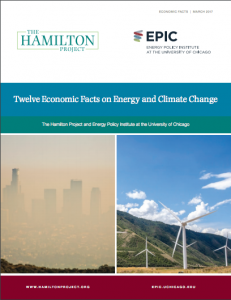Full Title: Twelve Economic Facts on Energy and Climate Change
Author(s):
Publisher(s): The Hamilton Project
Publication Date: March 1, 2017
Full Text: Download Resource
Description (excerpt):
The United States is in the midst of an energy revolution. The North American shale boom has unlocked vast quantities of natural gas, upending domestic electricity markets and enabling rapidly growing export volumes. American shale oil has sent global oil prices to their lowest sustained level in a decade and slashed U.S. imports in half. Meanwhile, the cost of renewable fuels like wind and solar electricity has plummeted, and they now account for the majority of new electric generating capacity.
Given this technological and economic context, the United States has perhaps never been better positioned to tackle the urgent threat of climate change. Though it is often discussed as a future problem, climate change caused by greenhouse gas (GHG) emissions is happening now. The concentration of carbon dioxide (CO2) in the atmosphere has increased from 317 parts per million in 1960 to more than 400 parts per million in 2016 (NOAA 2016), while the global average temperature has risen 1.6 degrees Fahrenheit (0.9° Celsius) above its 1960 level.
These changes are already impacting our everyday lives. Record-breaking temperatures, melting ice caps and more frequent coastal flooding, prolonged droughts, and damaging storms are just some of the intensifying risks we face as our planet continues to warm (IPCC 2007a). Despite these risks, the prices U.S. consumers pay for fossil fuels rarely reflect their costs, skewing consumption and investment choices away from cleaner fuels and discouraging the kinds of technological advancements that would allow the nation to make more efficient use of its energy resources
